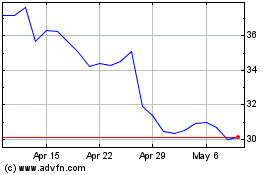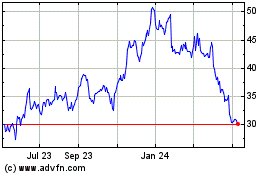Intel Uses Chips Acquired in Deal With Startup to Drive Deep Learning
November 17 2016 - 6:21PM
Dow Jones News
By Don Clark
SAN FRANCISCO -- Intel Corp. to intensify its efforts in a hot
new computing market, is taking the unusual step of relying on
technology developed by a startup it acquired.
The chip maker, determined to counter rival Nvidia Corp.'s lead
in the field known as deep learning, said it would begin shipping
chips in 2017 that it acquired through its purchase earlier this
year of startup Nervana Systems. Intel said it plans to integrate
Nervana chips and software with its general-purpose Xeon
microprocessors, which are used in most corporate data centers.
Deep learning is a fast-growing branch of the broader field
called artificial intelligence, which refers to systems that train
themselves by analyzing large sets of data rather than being
programmed in conventional ways. Companies such as Alphabet Inc.'s
Google, Facebook Inc. and Microsoft Corp. are widely using
deep-learning techniques to improve computers' ability to identify
speech and objects in images, among other tasks.
Many companies now carry out those chores using a combination of
Intel Xeon chips and Nvidia chips called GPUs, for graphics
processing units. Intel, though it didn't mention Nvidia by name,
said it expects the Nervana technology will allow it to train
deep-learning systems 100 times faster than with a GPU.
"The GPU architecture does not have a unique advantage for AI,"
said Brian Krzanich, Intel's chief executive, at a San Francisco
gathering focused on the technology. "It's not the only solution
that is out there."
Intel and others are placing multiple technology bets in the
field. Besides GPUs, companies such as Microsoft are also using
chips known as field programmable gate arrays, or FPGAs, for
deep-learning applications. Intel jumped on that trend by buying
Altera Corp., the biggest FPGA maker, in its biggest-ever
transaction.
In addition to Nervana, Intel in September cut a deal to buy
Movidius Ltd., another startup that specializes in vision-related
applications of deep learning.
Intel is looking to diversify from its longtime stronghold in
chips for personal computers, a market that has been slowing
lately. Mr. Krzanich has been pushing the company into new fields,
including wearable technology, drones and other connected devices
known by the phrase the Internet of Things, or IoT.
He predicted deep learning will become much more widely used --
not just in data centers, but to sift through the information
generated by connected devices. "Without some form of artificial
intelligence," such devices will only generate noise, Mr. Krzanich
said.
Intel also announced a relationship with Google to collaborate
on software and other technology for the search firm's cloud
service.
Patrick Moorhead, an analyst at Moor Insights & Strategy,
termed Intel's announcements impressive but noted that rivals such
as Nvidia will have their own countermoves. "It's now up to Intel
to flawlessly execute," he said.
Write to Don Clark at don.clark@wsj.com
(END) Dow Jones Newswires
November 17, 2016 18:06 ET (23:06 GMT)
Copyright (c) 2016 Dow Jones & Company, Inc.
Intel (NASDAQ:INTC)
Historical Stock Chart
From Mar 2024 to Apr 2024

Intel (NASDAQ:INTC)
Historical Stock Chart
From Apr 2023 to Apr 2024
